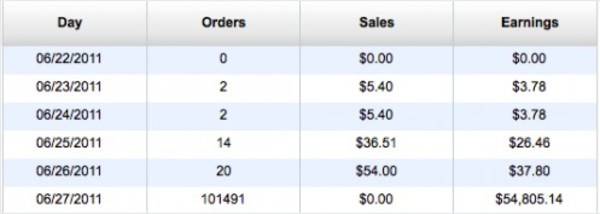When the Amazon Appstore was announced, there was great hope for the new platform. But application developers are growing unhappy with the e-commerce king. The promise was to bring eyeballs and dollars to apps. For some, only half of that has proven to be true and the gripes are starting to mount.

The Android Market was and continues to be a work in progress (with more malware infiltrating it every day): difficult to search and with no application filtering process, a la Apple. Amazon was supposed to be the cure for what ails the Android Market and untrustworthy, third-party application stores in general. It was supposed to be a regulated marketplace from a trusted source in the tech community. According to two Android developers, Shifty Jelly and Bithack, the Amazon Appstore experience has been anything but rewarding.
Shifty Jelly & The Case Of The Missing Revenue
Shifty Jelly is an Australian app maker that has produced the “Pocket” line of apps, mostly for iOS: Pocket Weather, Pocket Casts, Pocket Weather World and Weather Watch. The company’s contention with the Amazon Appstore concerns the feature that makes Amazon stand a head above the rest of the Android ecosystem – the free app of the day. Angry Birds, Plants vs. Zombies and other large titles have had turns as the free app. Amazon claimed when the Appstore came out that it would pay developers 20% of the app’s list price for every unit sold during free day promotions. So, if an app cost a dollar, the developer would still make $0.20 during free day promotions.
That is not the experience Shifty Jelly had. In a blog post earlier today, the company said that Amazon had sent them an email asking them to participate in the free app program, yet, at the bottom of the email, promising no revenue share for the company.
Here is the excerpt from the email:
As you may already know, the Free App of the Day offer placement is one of the most visible and valuable spaces on the Amazon Appstore. We would like to include your app “[name removed]” in our Free App of the Day calendar. We have seen tremendous results from this promotion spot and believe it will bring you a great deal of positive reviews and traffic. It is an opportunity to build your brand especially in association with a brand like Amazon’s. The current price of this placement is at 0% rev share for that one day you are placed.
Note: bolding emphasis added by Amazon, according to Shifty.
Treating Developers Like Unpaid Interns
Amazon is essentially asking Shifty Jelly to place its app in the free day promotion for the exposure. This is a common practice in the media industry, asking a writer to write free or cheap for the exposure or for the “clip.” See: Huffington Post. Yet, in the realm of public perception, Amazon looks like the good guys for helping developers out.
“What makes us mad though is the public perception that Amazon pays developers to be featured,” Shifty wrote in its blog. “Every single person we asked on Twitter or via email thought they were helping developers out, and getting a free application. Amazon does nothing to dispel these rumours, in fact they put really restrictive clauses at the bottom of their emails, saying that no one is even allowed to discuss these back door deals they are doing.”
Shifty says that it “sold” nearly 100,000 apps during its free day on the Amazon Appstore that would have translated to near $54,000. Yet, it did not make a cent and actually has to pay to acquire and maintain more servers to handle the traffic. It has since pulled its app for the Amazon Appstore and will not provide any updates (though it still provides functionality) to those who acquired it through Amazon.

In and of itself, Shifty’s experience is unfortunate. Yet, the company did know what it was getting into when it signed up for the promotion (the blog post says that it is part of the company’s experiment into Android apps as a mostly iOS developer).
Growing Developer Problems
Outside of the free day mishap, developers have had other problems with the Amazon Appstore. Shifty notes that Amazon has lengthy review times before posting an app to the store, sets the price of the app without input from the developers, rewrites the app description, does not provide error reports and pays later than Google.
These complaints are similar to what Bithack experienced and why it pulled its game, Apparatus, from Amazon in early July. Bithack cites the failure of Amazon to filter devices that apps are optimized for (for instance, games designed to work on large screens and robust processors or certain builds of Android). Bithack also complained that Amazon makes it difficult for customers to contact the developers (which is very easy in the Android Market) or respond to comment reviews if the developer is outside of the United States.
The International Game Developers Association warned developers against the Amazon Appstore in April. The organization cited concerns over distribution terms, pricing policies and discounting practices in Amazon’s policies. In a ReadWriteMobile poll in July, 38% of developers said they would not recommend the Amazon Appstore against 18% who said that they would. The rest (out of 99 votes) said maybe (16%) or they do not know because they have not tried it (27%).
Only Apple is Apple
Amazon is a company that does a lot of things right. Its e-commerce platform is unparalleled in the industry and Amazon Web Services will perhaps soon be a billion dollar vertical. It has successfully made the jump into devices with the Kindle and will probably be moderately successful with Android tablets and smartphones when they are released (in theory) later this quarter. Despite all the good things, it appears that Amazon has a developer problem more or less because it is trying to act like Apple.
Yet, there is a big difference between Apple’s Appstore and Amazon’s. Apple controls iOS, has sold nearly 200 million devices and has near 400 million apps within the platform. Developers have no choice but to adhere to Apple’s wishes and whims because not doing so essentially cuts them out of a huge portion of a profitable market. Apple has also had its fair share of developer mishaps. Amazon does not have that same luxury because, at this point, they are essentially a niche store that offers quality applications. Yet, instead of bending over backwards for developers to attract them away from the Android Market (or iOS), it appears that the company is making life difficult.
This may change over time. Amazon is actively hiring Android developers and team leaders for its mobile initiatives that should cut down on review time and maybe institute some new best practices. Yet, as Shifty and Bithack attest, the Amazon Appstore is currently a nightmare for developers.
We contacted Amazon for response to Shifty and Bithack but have not heard back from the company as of 6:00 p.m. EST on Aug. 2. We will update the story if Amazon does get back to us.

















